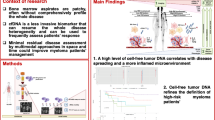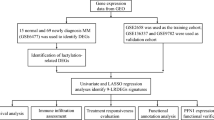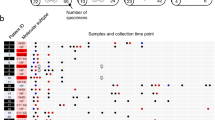Abstract
During the period September 1987 to March 1993 the proliferation of myeloma cells as colonies (MY-CFUc) in vitro was examined in bone marrow aspirates from 43 patients with multiple myeloma and two patients with Waldenström's macroglobulinaemia. Twenty-four samples from 45 patients, of whom three were at presentation, four were in complete remission (CR), six had achieved a partial response (PR) and 11 had progressive disease (PD), produced MY-CFUc in vitro. The same bone marrow aspirates or one taken within 2 months of that assessed for MY-CFUc were used in the polymerase chain reaction (PCR). Genomic DNA was analysed for mutations in N- and K-ras by slot blotting of the amplified products from the PCR with 32P-labelled probes and by direct sequencing. No mutations were detected in N- or K-ras proto-oncogenes at codons 12, 13 or 61 in any sample. Eleven of the patients from whom MY-CFUc were produced remain alive with a median survival of 73 months (range 15-75 months). MY-CFUc have been cultured from 19 of these 24 patients on subsequent occasions, of whom nine remain alive. Among patients whose cells did not produce MY-CFUc in vitro at the time of sampling for mutated ras alleles, biopsy samples from four patients have produced MY-CFUc in vitro on subsequent occasions, of whom one patient remains alive. The data show that the proliferation of MY-CFUc in vitro occurred independently of disease status and was not indicative of prognosis. The failure to detect mutated N- or K-ras alleles in any sample suggests that if such mutations were present in the cells which form colonies in vitro they represented less than 0.1% of the tumour burden and did not affect the survival of this group of patients.
This is a preview of subscription content, access via your institution
Access options
Subscribe to this journal
Receive 24 print issues and online access
$259.00 per year
only $10.79 per issue
Buy this article
- Purchase on SpringerLink
- Instant access to full article PDF
Prices may be subject to local taxes which are calculated during checkout
Similar content being viewed by others
Author information
Authors and Affiliations
Rights and permissions
About this article
Cite this article
Millar, B., Bell, J., Barfoot, R. et al. The proliferation of multiple myeloma colonies (MY-CFUc) in vitro is independent of prognosis and is not associated with mutated N- or K-ras alleles in human bone marrow aspirates. Br J Cancer 71, 259–264 (1995). https://doi.org/10.1038/bjc.1995.53
Issue date:
DOI: https://doi.org/10.1038/bjc.1995.53



